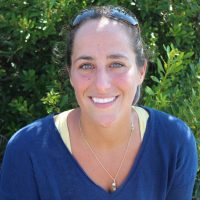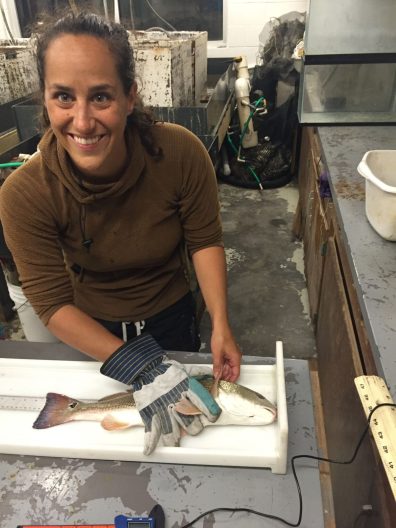Welcome Carter Smith, coastal ecologist and SAFS newest faculty member

This September, we’re joined by our newest faculty member, Assistant Professor Carter Smith, an interdisciplinary coastal ecologist whose interests lie at the intersection of multiple disciplines including community ecology, conservation and restoration science, and coupled human natural systems research.
Making the move to SAFS from Duke University Marine Lab, NC, where she was a Lecturing Fellow, Carter describes her journey to becoming a scientist as very circuitous. “My whole childhood I always wanted to be a performer, so I majored in Theater Arts in undergrad, but during that time I also worked a lot in outdoor education and as a mountain guide for NOLS,” Carter shared. “I fell in love with teaching, being outside, and exploring.”
After graduating from college, Carter channeled this passion into an outdoor education job, and worked with the Catalina Island Marine Institute, teaching a week-long marine biology curriculum to 4th–12th graders. “It was during this time that I absolutely fell in love with the ocean and hatched the idea to go back to school and do a PhD, despite knowing nothing about research,” Carter said. “Luckily, my PhD advisor, Charles Peterson, thought it was really cool that I had taken an advanced puppetry class and didn’t seem to mind that I didn’t have a science degree, and he took a chance on me.”

Once joining his lab, Carter recalls a strong desire to do field work and wanting her work to have strong applications. “I was given total freedom to decide what I wanted to study, and I started reading about different novel restoration techniques for coastal protection that were being used in NC and thought it was such an exciting idea that married my interests in community ecology, applied ecology, and social-ecological systems.”
Sharing what excites her most about joining SAFS, Carter said: “I’m really excited about joining such a distinguished faculty group with very diverse research interests, in an area of the world that is very supportive of habitat restoration and that has a track record of working to manage resources with diverse stakeholders.” Setting up her Coastal Ecology and Restoration Lab at SAFS, Carter will be recruiting students who have varied interests related to applied ecology.
Coming from the East Coast to the Pacific Northwest, Carter says one thing she is not looking forward to is the cold water. “I have never worked in Puget Sound, so it’s exciting to use this first year to explore, observe, and chat with coastal managers and restoration practitioners to understand priority research needs. I’m intrigued to see what lessons and observations that I’ve made on the East Coast can be applied to ecosystems in Puget Sound. But the cold water…I’m not excited about that.”
Carter’s research is not system specific, and the opportunity to work along urban shorelines, and in the seagrass, oyster, and saltmarsh ecosystems that make up Puget Sound is a prospect she’s eager to explore.
Now, enough about work – what is Carter’s favorite marine organism? “Abalone, because they are so beautiful and also delicious.” Welcome to SAFS, Carter!